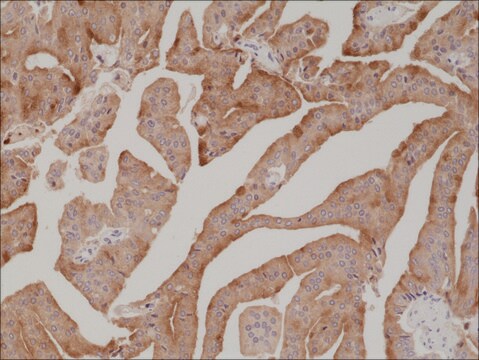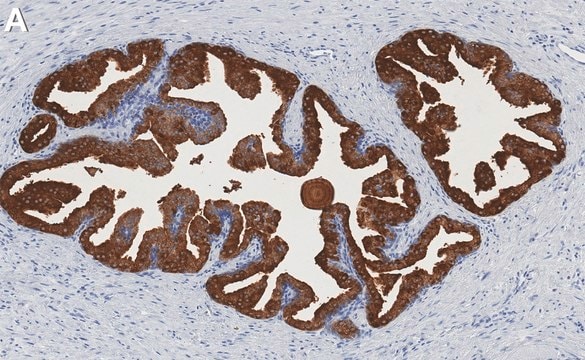SCP0224
Prostate Specific Antigen Substrate
≥95% (HPLC), lyophilized
Synonym(s):
KLK3, Kallikrein-related peptidase-3, PSA
Sign Into View Organizational & Contract Pricing
All Photos(1)
About This Item
Empirical Formula (Hill Notation):
C44H64N12O13
Molecular Weight:
969.05
UNSPSC Code:
12352204
NACRES:
NA.32
Recommended Products
Product Name
Prostate Specific Antigen Substrate,
Assay
≥95% (HPLC)
form
lyophilized
composition
Peptide Content, ≥75%
storage condition
protect from light
storage temp.
−20°C
Amino Acid Sequence
Mu-His-Ser-Ser-Lys-Leu-Gln-AMC
General description
Prostate specific antigen (PSA) is a kallikrein-related serine peptidase that belongs to the chymotrypsin subfamily serine protease. It was originally found in human semen. PSA is also detected in serum correlated to benign and metastatic disease.
Application
Prostate Specific Antigen Substrate has been used to assay recombinant severe acute respiratory syndrome coronavirus-2 viral 3-chymotrypsin-like cysteine protease (SARS-CoV-2 3CLpro).
Biochem/physiol Actions
Prostate specific antigen (PSA). It exhibits chymotrypsin-like activity. PSA is the most abundant protease found in the prostate and secreted into the seminal fluid. It is a useful biomarker for prostate cancer. PSA digests the gel-forming proteins semenogelins I and II in semen. It shows antiangiogenic activity in vitro and in vivo.
Storage Class Code
11 - Combustible Solids
WGK
WGK 3
Flash Point(F)
Not applicable
Flash Point(C)
Not applicable
Choose from one of the most recent versions:
Certificates of Analysis (COA)
Lot/Batch Number
Don't see the Right Version?
If you require a particular version, you can look up a specific certificate by the Lot or Batch number.
Already Own This Product?
Find documentation for the products that you have recently purchased in the Document Library.
Customers Also Viewed
Anneliese S Ashhurst et al.
Journal of medicinal chemistry, 65(4), 2956-2970 (2021-11-04)
Cathepsin L is a key host cysteine protease utilized by coronaviruses for cell entry and is a promising drug target for novel antivirals against SARS-CoV-2. The marine natural product gallinamide A and several synthetic analogues were identified as potent inhibitors
Drake M Mellott et al.
ACS chemical biology, 16(4), 642-650 (2021-04-01)
Host-cell cysteine proteases play an essential role in the processing of the viral spike protein of SARS coronaviruses. K777, an irreversible, covalent inactivator of cysteine proteases that has recently completed phase 1 clinical trials, reduced SARS-CoV-2 viral infectivity in several
G S Coombs et al.
Chemistry & biology, 5(9), 475-488 (1998-09-30)
The serine protease prostate-specific antigen (PSA) is a useful clinical marker for prostatic malignancy. PSA is a member of the kallikrein subgroup of the (chymo)trypsin serine protease family, but differs from the prototypical member of this subgroup, tissue kallikrein, in
Anneliese S Ashhurst et al.
bioRxiv : the preprint server for biology (2021-01-06)
The emergence of SARS-CoV-2 in late 2019, and the subsequent COVID-19 pandemic, has led to substantial mortality, together with mass global disruption. There is an urgent need for novel antiviral drugs for therapeutic or prophylactic application. Cathepsin L is a
Blocking serine protease activity prevents semenogelin degradation leading to hyperviscous semen in humans.
Anamthathmakula, et al.
Biology of reproduction, 106, 879-887 (2023)
Our team of scientists has experience in all areas of research including Life Science, Material Science, Chemical Synthesis, Chromatography, Analytical and many others.
Contact Technical Service









